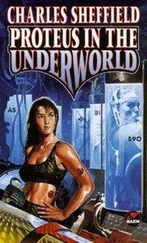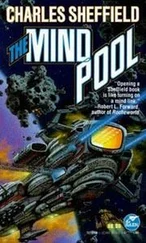“And then he killed you.”
“No. Then he recruited me. Not to the Duke of Bosny’s service, but for a project of his own. He told me he was putting a specialized team together to go to the stars. He believed that the other freelance expeditions were doing everything wrong, and he knew better. His team was almost assembled, and an inventor and tinkerer like me was the final component. If I could learn what was needed, I was in. Otherwise, it would be back to Earth and the Gallimaufries. He sent me away to a little planetoid called Horus, and tried to give me a proper education. It didn’t work out too well. Turned out I had to learn things my own way, or not at all.”
“But you must have learned. You didn’t go back to Earth.”
“There were other reasons for that. Just before I finished on Horus and found out whether I was in or out, news came back from Mercantor about the Guljee Expedition, with all the killings. The other Stellar Group members decided it was the final proof that humans were too bloody-minded to wander free around the stars. Right after that they put the quarantine in place. Chan Dalton had to disband the team. We all went our separate ways. He gave me my freedom, and enough money to start another life. I kept in touch with the other team members for a long time, but when the quarantine went on and on we drifted apart and lost contact. With the road to the stars closed, there was no point in thinking of ourselves as a team. It was a depressing period for everybody. But you’re too young to remember it.”
“No I’m not. One of my first memories was the big news that none of the Link access points were working.”
“Not quite that. We could go anywhere within the extended solar system. But nothing beyond a lightyear.”
“Surely the Geyser Swirl is more than that. We’re a lot more than a lightyear from the Sun.”
“More than a hundred lightyears. That’s one of the mysteries we came here to solve: Why is there a Link access point open to humans? Well, we’re here, and no closer to finding out.” Bony waved his arm around at their barren surroundings. They had been walking steadily as they talked, and had reached the top of a sharp-edged ridge. The black rock showed signs of weathering by wind and rain, but nowhere in all the expanse of hills and valleys ahead could the eye find any sign of a living thing. The sun was lower in the sky, and soon it would be time to turn back.
“In fact,” Bony went on, “we have other mysteries. How could we come through a Link and arrive in the middle of the sea? Our mass detector is supposed to inhibit a Link transit when there’s matter at the other end.”
He was talking too much, and more to himself than to Liddy. He was surprised to hear her say, “And now there’s one more mystery to explain.”
“What’s that?”
“Well, you said there was no life on land, and I assume that included birds.” Liddy was pointing off to the left. “But isn’t that a bird?”
Bony followed her arm and at first could see nothing. Then he caught the dark moving point in the sky. A bird.
So there were birds, or at least some kind of flying animal. He had been wrong about that, and he must be just as wrong about life on land. Surely a flying form couldn’t evolve directly from a sea-creature without a land form in between.
The moving dot was larger, drifting across the sky on a slanting course that would cross their own path far ahead of them. Bony stared hard, trying to make out details of the flying shape.
“I see a tail behind the main lobes,” Liddy said. Her eyes must be sharper than his. “And a line of little dots on the side of the body. I think — yes, it’s turning. There are wings. But—”
Bony could see them, too. The moving shape was banking. As it did so, the profile as seen from below was revealed. It was the same triple-lobe winged form that had cast its shadow on Bony when he was on the seabed. And something else. The sun was at their back, and the sunlight catching the underside of the object turned it to a silvery gleam.
“That’s reflection from metal,” Liddy said excitedly. “It’s a ship!”
“It is. And it’s big . Those `little dots’ you see on the side are ports. But how can it fly, with a shape like that? It seems to just hang in the air.” Bony grabbed Liddy’s arm. “Come on. It will be getting dark in another hour or two and we don’t want to find ourselves wandering around the sea at night. We have to get back to the Mood Indigo and tell Friday what we’ve learned.”
Liddy gave him a questioning look, but she turned at once and allowed him to lead her back the way that they had come. She didn’t say anything, but Bony suspected that she knew the real reason he wanted to return to their ship. It had nothing to do with their responsibility to report everything they found to the official leader of the expedition, Friday Indigo. It was the fact that the outline of the ship they had just seen did not resemble any design in use by humans or other species of the Stellar Group. It was not the product of Tinkers, Pipe-Rillas, or Angels. The ship they had seen wasn’t just alien, it was alien alien.
Bony had a sudden suspicion that the land surface of Limbo might offer greater dangers than the depths of its oceans.
Chan Dalton, his arrival at Europa less than two hours ahead, was still trying to make up his mind.
It was the classic question; you had two tasks to perform and one promised to be much harder and more unpleasant than the other. Did you tackle the tough one first and get it out of the way? Or did you postpone, and hope that before you came to the hard part you might be struck by a meteorite, or that a solar flare would wipe out life in the solar system?
The angry weapons master first, or the cheerful dreamer? Deb Bisson, or Tully O’Toole?
Chan made up his mind — after a fashion. Whoever was closer to his arrival point, that’s the one he would call on first. And let’s hope that it was Tully the Rhymer, the disheveled dreamer.
The message unit was nagging for attention. Probably to give the ship its final docking instructions. Chan casually flipped the switch, then sat up straighter as the imaging region filled with a three-dimensional whirlpool of colors.
A shape gradually coalesced, a bulky green mass with waving upper fronds. A computer-generated voice said, “Chan Dalton?”
“You’re an Angel.”
“No. We are the Angel. The Angel who was with you on Travancore, the Angel with whom you once mind-pooled. Such pooling is now permanently forbidden, but are you that same Chan Dalton?”
“Of course I am. Can’t you tell?”
“All humans, unfortunately, look much the same to us. We can now proceed. We are linking in from the home-world of Sellora.”
“That’s impossible. This ship doesn’t have equipment for direct interstellar linkage.”
“Not impossible, merely improbable. When you have eliminated the impossible, whatever remains, however improbable, must be the truth. We assure you, we are linking to your ship. Chan Dalton, we must talk. We have heard that you are in the process of assembling a team of humans; in fact, the same team of humans who many of your years ago submitted a plan for travel to unknown parts of the Perimeter.”
“That’s—” Chan had been about to say again that it was impossible for anyone except himself to know such a thing. He restrained himself. It would merely encourage the Angel to offer another human platitude or quotation. “How do you know what I’m doing?”
“An Angel has the potential to simulate the thought processes of any particular human, provided that there has been enough prior contact. You had a most intimate contact with us. We know how you think.”
Читать дальше












